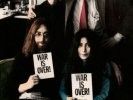Eye For Film >> Movies >> The US vs John Lennon (2006) Film Review
Imagine, for a moment, you could do anything. What would you do?
Already at the height of his career, the sheer scale of possibilities before John Lennon amazed even this high-aspiring rebel. Triggered in no small part by his meeting with Yoko Ono, a conceptual artist obsessed with breaking down barriers, Lennon had to decide if there was a greater purpose to which he could devote his musical talent, fame and fortune. Mass protests against the Vietnam War were sweeping America. Lennon's aspiration became quite simple (some would say simplistic): let's give peace a chance. The US vs John Lennon uses previously unreleased archive footage, plus documentation obtained under the Freedom of Information Act, to chart this ex-Beatle's political activism and his struggle with the US authorities in the late Sixties and early Seventies.

It's a remarkable tour de force. Many people know Lennon as an ex-Beatle, for his song Imagine and the fact that he got shot. The extent of his political activism, the method in his apparent madness, would seem more like another conspiracy theory in less capable hands. Lennon's efforts seem directly linked (initially) to getting another activist out of jail and then making sure the war-bent presidency, White House and FBI lose lots of sleep over the war.
Directors Leaf and Scheinfeld are past masters at making serious pop culture retrospectives. In an age of technology and spin, how do we know 'documentary' filmmakers are telling us facts? Firstly, what's on the film. There are interviews with high-ranking former government and FBI agents. Then there are declassified documents, not just quoted but shown on the screen. Finally there is the official website which provides an external way of checking transparency and sources once you get home. If you thought Lennon was a cool guy - or maybe even your childhood hero - this film shows how incredibly cool - and courageous - he actually was.
Says director Scheinfeld: "We live in a time where everything's a reality show. John and Yoko were essentially pioneers in that, but they weren't using it to promote an album. They weren't using it to promote a movie. They weren't doing it to promote anything except peace and that's what makes them heroic artists here. And then to have the courage to stand up to the power of the United States - the presidency, the White House, the FBI and the INS..."
Lennon's song Give Peace A Chance became the national anthem of the anti-war movement. He linked up with other activists (including the Black Panther movement) using his public persona - and often his own money - to synchronise the peaceful protests and give them such force that, at the point where Nixon was campaigning for re-election, Lennon had been singled out for deportation. He backed down over personal appearances at an anti-Nixon concert tour (which would follow the latter's campaign trail) as government officials stepped up the campaign of harassment against him with wiretapping and surveillance. Rightly or wrongly, Lennon feared for his life. This was a time when the Secret Services had the authority to take people out if deemed in the national interest.
The website documentation shows how the Reagan administration continued to obstruct release of information on Lennon even in April 1981. The FBI cited its authority under the Freedom of Information Act to withhold "information which is currently and properly classified... in the interest of the national defense or foreign policy."
The downside of the film is that many people simply won't care. Gore Vidal takes a modern sideswipe at Bush and Iraq, but the comparison is weak. Vietnam was not preceded by a 9/11 or a Pearl Harbour and the united opposition to the Vietnam War was on an unprecedented level: protests turned into riots, several civilians were shot, and the powers of the government were far reaching even by today's standards. Although the film sometimes plays like a top-notch TV documentary, the levels of professionalism shown by the filmmakers set it apart. It's also an unsung paean to the most important part of Lennon's life and what he would no doubt like to be remembered for. He might not have been Gandhi, but there was more to him than the wacky, druggy rockstar most of us remember.
"You may say that I'm a dreamer, But I'm not the only one," wrote Lennon.
It reminded me of another famous saying: "All men dream: but not equally... the dreamers of the day are dangerous men, for they may act their dream with open eyes to make it possible." The US vs John Lennon is more than a testament to John Lennon. It is the story of how one man tried to make his dreams reality.
Reviewed on: 30 Nov 2006If you like this, try:
Chicago 10Good Night, And Good Luck
The Killing Of John Lennon
Woodstock Diaries





















